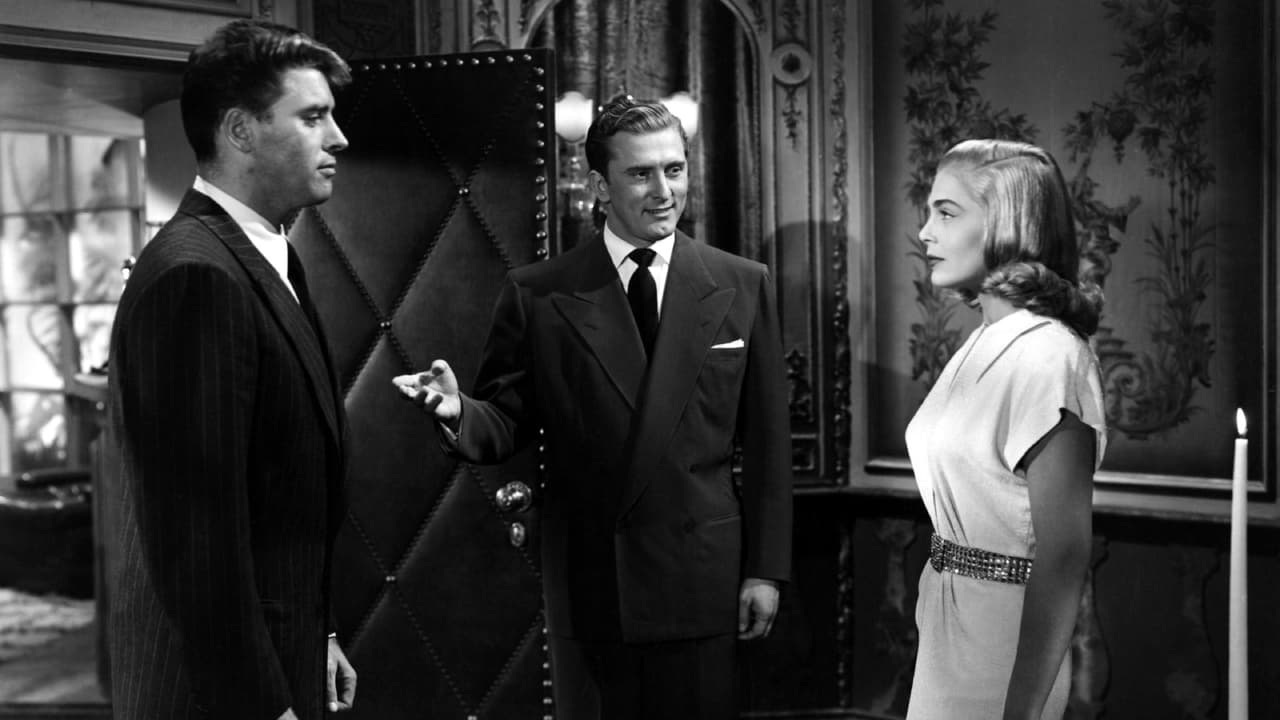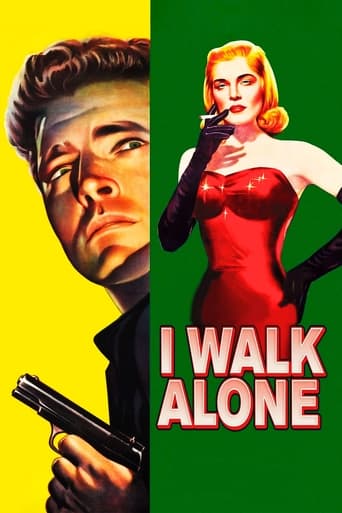

Copyright 29 July 1947 by Hal Wallis Productions, Inc. Released through Paramount Pictures. New York opening at the Paramount: 21 January 1948. U.S. release: 16 January 1948. U.K. release: 19 January 1948. Australian release: 18 March 1948. Sydney opening at the Prince Edward: 5 March 1948 (ran three weeks). 8,771 feet. 97 minutes.SYNOPSIS: After serving time in jail, Frankie Madison demands a half-share in a nightclub from his old partner, Noll Turner.NOTES: The stage play opened on Broadway at the Coronet on 27 October 1945, closing after only 25 performances. Paul Kelly had the Burt Lancaster part, while Luther Adler played the heavy. Also cast: Dorothy Comingore, Adrienne Ames, Herbert Berghof, Tom Pedi, George Mathews, E.G. Marshall and Arthur Hunnicutt. Oscar Serlin produced, Harold Clurman directed. COMMENT: The writers have come up with a few fascinating new angles on the classic convict-seeks-revenge plot, turning what could have been merely another gangster story into an engrossing film noir that rivets the attention from start to finish. The sharp dialogue and zesty characterizations of the play have been fleshed out by superlative performances all around. Lancaster is exactly right as the bitter ex-con, an innocent in a now-too-sophisticated world of shady finance. His nemesis is powerfully represented by Kirk Douglas, here reprising his ruthless heavy from Out of the Past. Although she has unjustly copped a fair amount of downgrading from jealous critics, sultry Lizabeth Scott is at her most stylishly convincing best as the put-upon heroine. Also compelling are wonderfully glum-faced Wendell Corey as the harassed accountant who cooks Douglas's books, and George Rigaud as the schemer's confidant. Good to see George in a decent-sized role for once.Other appealing contributors include Kristine Miller as a socialite with a yen for low life; Marc Lawrence as Burt's sympathetic pal (for a switch, Marc is operating on the right side here, even if still on the shady ledger of the law); Mike Mazurki as the doorman-bouncer, also sympathetic to the hero's plight, but nonetheless loyal to his current employer. Mike, in his best role since Moose Malloy, enjoys some of the script's best lines: "Did you see that right hook he caught me with? I always liked the guy. Fifteen years ago, he was the greatest!" The movie is nothing if not superbly lit. The visuals are often quite excitingly photographed and composed. In fact, as usual with Hal Wallis productions, production values are first-class, with really outstanding technical credits, including the appealing seats, attractive costumes, and one of Victor Young's most lovely scores.OTHER VIEWS: This one was written by "George Addison", a pseudonym I used years ago for various newspapers and magazines. My opinions may have changed in the meantime, but the review was valid when it was written and deserves to be reprinted. In fact, I've had people write to me that they preferred George Addison's insights to my own! Like Casablanca, here's another excellent example of an unsuccessful stage play translated into an outstanding movie. And like Casablanca, the credit belongs mainly to producer Hal Wallis who saw potential in the original property and then oversaw its repackaging as a film. In this case, he even persuaded Byron Haskin to resume directing after a break of twenty years in special effects. Haskin has induced solid performances not only from the principals and co-stars but even from minor players like Mickey Knox as the abrasive Skinner and Olin Howlin in a brief bit as a night-watchman. (And is that former cowboy star Jack Perrin in a silent walk-on as the cop who looks over the parked taxi?)The screenplay incorporates several unusual elements for a film noir. Involved corporate structures, designed to freeze out the Lancaster character, successfully defeat his quest for vengeance. But the ex-con is also sidetracked by a heavy romantic entanglement with a voluptuous but increasingly sympathetic siren. The conventional roles of vulnerably innocent heroine and sexy femme fatale are here skillfully rolled into one. It says much for Lizabeth Scott's utterly convincing portrayal that her playing of this difficult, complicated role never once falters or strikes a single wrong note.In addition to its proud ensemble acting, I Walk Alone also benefits from masterfully realized sets, costumes, lighting and music scoring. This is a film with atmosphere. In spades.
... View MoreAt the time - mid-late forties - they were churning out movies of this genre and this standard Hershy Bars, today they're harder to find than Auk eggs, which makes this doubly precious. There's so much that's right about it that it's tough to find a flaw. Even the usually insipid Lizbeth Scott turns in a half-decent performance and if Wendell Corey is as wooden as ever at least he is a pleasant walnut burr. This was the first of seven teamings for Kirk Douglas and Burt Lancaster and they started as they meant to go on, Kirk the smooth schemer and Burt the starry-eyed bruiser and a good time is had by all not least the audience.
... View MoreNo need to recap the plot. There's one key scene unlike anything in the rest of 40's noir. Frankie (Lancaster) invades Dink's (Douglas) office to muscle in on what he's owed of Dink's big operation. But Frankie's a gangster of the uncomplicated 1930's, while Dink's a white-collar criminal of the coming 1950's. So. By the time Dink's accountant Dave (Corey) is through answering each of Frankie's threats with another layer of corporate ownership that can't possibly be divided, Frankie's reduced to a bundle of quivering frustration. In short, Dave has beaten all Frankie's assembled thugs with what amounts to a maze of legalese. As a result, piles of paper prove ultimately more powerful than gangs of gunmen in what amounts to a great unexpected scene.All in all. The movie's decent 40's noir, long on atmosphere but too long on talk, at least to my liking. I suspect the screenplay was tailored to showcase producer Wallis's top 3 new stars, especially Scott who gets a lot of romantic dialog along with sultry screen time. The overall result is a movie composed of too many under-blended showcase scenes- - some quite good-- that nevertheless don't really gel into a compelling whole. It's the kind of movie where the stars are more memorable than the story.Scott and Douglas, for example, really shine. Scott does some of the best acting of her career as the conflicted glamour girl. But I especially like Douglas's slimy version of a smooth-talking mastermind who's so self-assured, you can't wait to see him get what he's got coming. Douglas's early career specialized in such compromised types, a revelation to those only familiar with his later, more heroic, career. For his part, Lancaster does well enough with his distinctive looks, but Frankie is a less showy role than the other two.Anyway, one thing for sure—producer Wallis certainly had an eagle eye for new talent, as this movie more than demonstrates.
... View MoreI like I WALK ALONE. It is an interesting example of film noir, but it also has curious slants of it's own. It is also one of the first pairings of Kirk Douglas and Burt Lancaster in film. Douglas and Lancaster were so well balanced in their movies that they were interchangeable. While in most of them they were allies or buddies (THE DEVIL'S DESCIPLE, GUNFIGHT AT O.K. CORRAL, TOUGH GUYS) they could alternate as the villain against each other. It's hard to find a pair of actors who did this as well or at all. Matthau and Lemmon usually were in comedies (although they both could be at loggerheads on some ethical points or past history). Grant and Ralph Bellamy are normally love rivals (Bellamy being hopelessly outclassed). Crosby and Fitzgerald are usually in a battle of the generations, and a confrontation of two street smart types. And so it goes in other male pairings.SPOILERS AHEAD: Here, Kirk is the villain - he got away with a large stolen cash prize in a crime back in the 1920s/early 1930s. His partner Burt got caught, and was sent to prison for 14 years (actually rather lucky for him - a cop was killed). Burt is now out of prison, and he discovers that Kirk is quite a social success. He took the money and used it to build a gang, but he was smart enough to use his profits to get a legitimate sheen to his image: he's a successful "nightclub" owner with many wealthy friends and customers. One of the best moments early in the film is when Lancaster sees newspapers and magazines that show Douglas swanning with the swells (even wearing top hat and overcoat in a rotogravure shot). Not quite like the good old Dillinger days, or even Al Capone.Other films had touched upon the "legitimization" of mob money as time passed. In THE ROARING TWENTIES, while Jimmy Cagney is building up his hooch empire he invests the money in a legitimate taxi company (an early example of money laundering), only to lose everything when the stock market crashes. Ironically, his untrustworthy second-in-command (Humphrey Bogart) never diversifies but keeps to the illegal activities. He not only survives the crash, but he profits by it (taking over Cagney's property - though he contemptuously leaves him one taxicab). But even he tries to pick up a better public image - you see him practicing his putting in his office at one point.Lancaster confronts Douglas in his nightclub, only to be brought into the modern world of organized crime. All Lancaster really wants is his half of the original money. But as Douglas' accountant, Wendell Corey, says they can't just give him the cash as it has been invested throughout Douglas's financial empire. Lancaster is left without cash, and led a chase as well by Douglas using Lizbeth Scott as femme fatale bait. He ends up getting beaten (by Mike Mazurki). But he remains determined to beat Douglas and get his share.He does in a manner that today would not pass muster. He entraps Douglas by pretending to have him at the end of a loaded gun, forcing Douglas to make a confession before the police. Douglas, naturally frightened, does admit information that only the criminal involved in the crime would have known, but at the end, he sneers at Lancaster saying that the confession was gotten under duress. But then Lancaster shows his gun was empty. Civil libertarians today would denounce this trick, saying the confession was tainted. In 1948 it was perfectly legal.
... View More